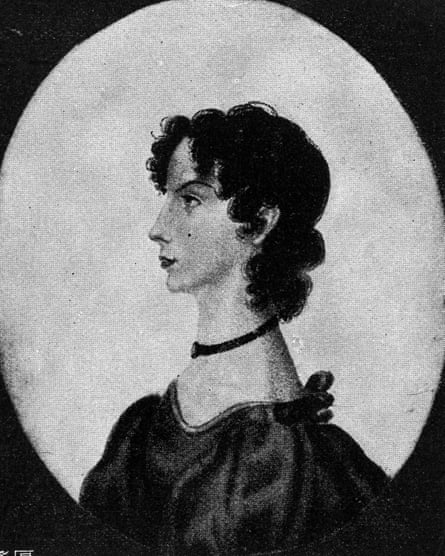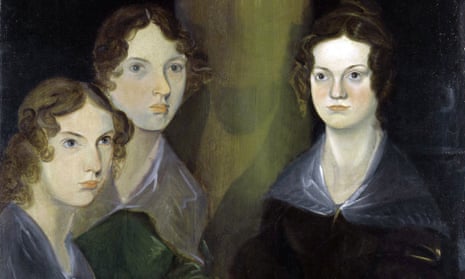We know about Emily Brontë (who gave us Wuthering Heights, Cathy, Heathcliff, Laurence Olivier in leather britches striding across Hollywood moors – for which, absolutely, many thanks – and Kate Bush) and Charlotte Brontë (Jane Eyre, the red room, mad wife in the attic, blinded Byronic hero who nevertheless sees through the heroine’s plain exterior to love the passionate heart within). But who, really, has heard of Anne Brontë? We are more likely to know about their drunken brother Branwell, who never got his act together, than we are about the third sister. Why is she the underdog, the unknown Brontë, when any reading of their collected works will show her talent burning as brightly and as fiercely as those of her famous sisters?
Always slow on the uptake, it wasn’t until I read The Tenant of Wildfell Hall, aged 20 at university, that I realised literary reputations might not be the purely meritocratic things I thought they were. Here was a book, published in 1847, laying out in remorseless, compelling detail the effects of a husband’s alcoholism on a woman, Helen Graham, and her son – and her fight to begin a new life away from his violence. So perfectly did it capture the powerlessness and fear of the female experience that I remain convinced to this day that to read it is to be armed for ever against the traps into which the unwary Helen fell. Anyone who professes not to understand “why women stay” should read it – and be re-educated from top to bottom.
Twenty years on, I am striding across the West Yorkshire moors, arguing with my co-presenters Martha Kearney (Charlotte devotee) and novelist Helen Oyeyemi (Emily champion) about Anne’s unacknowledged supremacy for Being the Brontës. This BBC documentaryexamines those few years in that house in Haworth when they all wrote and published those extraordinary novels. We have been in the town a week and the general consensus is that, relative literary merits aside, they were all geniuses for managing to keep dry enough and warm enough to put pen to paper at all.

The near-simultaneous publication of Jane Eyre, Wuthering Heights and Agnes Grey was perhaps Anne’s first misfortune. Her debut was almost literally subsumed by Emily’s. Wuthering Heights comprised two volumes of the standard tripledecker format of the time, while Anne’s tale of a governess, based on her own experiences of teaching variously appalling children in rich houses, made up the third. The problem of course was that Wuthering Heights was, well, Wuthering Heights – a mad, fever dream of a novel that couldn’t and shouldn’t be doing all the extraordinary things it does, elemental and impossible all at once. It sucked up all the available column inches, while Agnes Grey – a spare, quiet tale of suffering and endurance that prefers unflinching realism to wild romance – went largely unremarked. Context is not all, but it matters.
In 1914, when the moorland mist had cleared a little, Agnes Grey was re-evaluated to a degree, with writer May Sinclair, for example, noting that “Anne Brontë attacks her problem with a freedom and audacity before which her sisters’ boldest enterprises seem cowardly and restrained. Her behaviour is revolutionary.” Ten years later, George Moore called the book “the most perfect prose narrative in English letters” and suggested that if Anne had lived, she might have taken a place next to Jane Austen. But it was too little too late.
The Tenant of Wildfell Hall, published a year after Agnes, might have changed things for Anne, but this time she was hamstrung not just by critics’ disapproval (they noticed this book but condemned its shocking “coarseness”, feminism and Helen’s violation of social convention and contemporary English law) but also by her own sister’s distaste for the book.
Anne stood up to the critics, making her stance clear in the preface to the second edition in which she called them “more bitter than just” and insisting that the depiction of vice they claimed she gratuitously included and revelled in was a necessary function of art. “Oh reader!” she wrote. “If there were less of this delicate concealing of facts – this whispering, ‘Peace, peace’ when there is no peace – there would be less of sin and misery to the young of both sexes who are left to wring their bitter knowledge from experience.”

And she delivered as unyielding a response to those who thought – and were seized with horror at the thought – that it had been written by a woman. “I am satisfied that if a book is a good one, it is so whatever the sex of the author may be … I am at a loss to conceive how a man should permit himself to write anything that would be really disgraceful to a woman, or why a woman should be censured for writing anything that would be proper and becoming for a man.” But there was little she could do about what appeared in Charlotte’s introduction to Tenant in the editions published after Anne’s death, which occurred in Scarborough in May 1849.
Charlotte always stood in (slightly fearful) admiration of Emily’s genius – she referred to her as “a giant” and “a baby god” – but she seems never to have fully appreciated the younger sister’s work. Maybe a sister (or an author) does not have it within herself to build another up without unconsciously tearing the other down? Or maybe their temperaments and talents were just too different for her to see Anne’s for what they were?
Either way, Charlotte surely did Anne’s reputation and levels of posthumous fame no favours by writing in her introduction to her sister’s second novel: “Wildfell Hall it hardly appears to me desirable to preserve. The choice of subject in that work is a mistake – it was too little consonant with the character – tastes and ideas of the gentle, retiring, inexperienced writer.” It continues in this vein for some time. As the Brontës’ biographer Juliet Barker puts it: “Charlotte, it appears, was prepared to consign her sister’s novel to oblivion because she considered its subject at odds with her own perception of what Anne’s character was and ought to have been.”
Context matters, especially when it contains an elder sister with a particular set of idées fixes. But to read the books now in a contemporary context is a liberation. We can see what her sister could not. We are not blinded like Anne’s critics by her “coarseness” nor distracted by speculation about her sex. I’d like to think her time has come.
- Being the Brontës is on BBC2 on Saturday 26 March at 9pm.

Comments (…)
Sign in or create your Guardian account to join the discussion